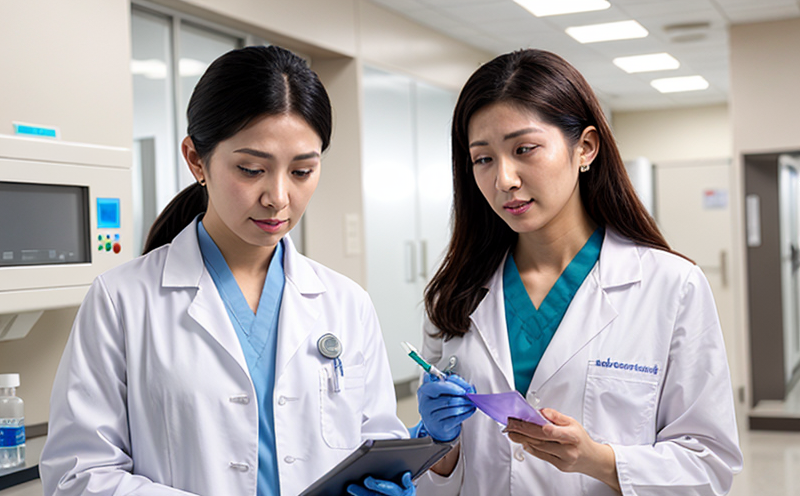JP Endotoxin Testing of Biosimilars
The Japanese Pharmacopoeia (JP) endotoxin testing is a critical quality control procedure essential for ensuring the safety and efficacy of biopharmaceuticals, including biosimilars. This test evaluates the presence of endotoxins—a potential contaminant that can trigger a harmful immune response in humans. The method is stringent as it requires precision instruments and highly skilled personnel to ensure reliable results.
The Japanese Pharmacopoeia, which is one of the most respected compendiums for pharmaceutical standards globally, mandates this testing to guarantee the safety of medicinal products. Biosimilars are biologics that are similar but not identical to an approved reference product and have been gaining significant attention in the pharmaceutical industry due to their potential cost-effectiveness.
The endotoxin test aims to detect endotoxins, which are a component of bacterial cell walls. These contaminants can lead to pyrogenic reactions in patients, posing serious risks such as fever, chills, and potentially life-threatening conditions like sepsis. Ensuring the absence or presence within acceptable limits is crucial for the safety profile of biosimilars.
JP endotoxin testing follows specific protocols that include sample preparation, reconstitution, dilution, and incubation periods. The test uses a chromogenic assay to measure the amount of endotoxins present in the sample. This process involves several steps: first, the sample is prepared by reconstituting it with a buffer solution. Then, it undergoes multiple dilutions before being introduced into a cartridge containing Limulus amebocyte lysate (LAL), which reacts to detect even trace amounts of endotoxins.
The test parameters are stringent and require precise handling to avoid false positives or negatives. The incubation period can vary depending on the sample type, but it is typically around 4 hours for most biosimilars. During this time, any endotoxin present will cause a color change in the solution, indicating its presence.
The acceptance criteria are based on the Japanese Pharmacopoeia standards, which specify that the test must yield results below the acceptable limit of endotoxins, usually 0.5 EU/mL for parenteral products. Compliance with these limits ensures that the biosimilar is safe for clinical use and meets regulatory requirements.
Given the complexity and criticality of this testing, it is essential to choose a laboratory equipped with state-of-the-art facilities and experienced personnel. Eurolab, for instance, offers comprehensive endotoxin testing services that comply strictly with JP standards. Their expertise ensures accurate and reliable results, which are vital for maintaining product quality and patient safety.
The importance of this test cannot be overstated in the context of biosimilars. As more companies seek to produce these cost-effective alternatives, ensuring their safety is paramount. By adhering to strict JP standards, pharmaceutical manufacturers can confidently demonstrate that their products are safe for human use and comply with regulatory requirements.
Benefits
- Enhanced Patient Safety: Ensures the absence of endotoxins, which can cause severe adverse reactions in patients.
- Regulatory Compliance: Meets stringent JP standards that are internationally recognized and respected.
- Quality Assurance: Provides reliable data to support product quality and consistency.
- Informed Decision-Making: Helps in making informed decisions about product safety, efficacy, and regulatory compliance.
Eurolab Advantages
Eurolab stands out as a premier choice for JP endotoxin testing of biosimilars due to its advanced facilities, experienced team, and commitment to quality. Our laboratories are equipped with the latest technology and reagents used in this stringent test.
The expertise of our personnel ensures that each step of the process—from sample preparation to final analysis—is carried out meticulously. This level of precision is crucial for generating accurate results that can be trusted by regulatory bodies and pharmaceutical companies alike.
We offer a range of services tailored to meet the specific needs of our clients, including comprehensive testing packages, customized reports, and detailed insights into the endotoxin levels in biosimilars. Our goal is not only to provide reliable data but also to assist our clients in making informed decisions about product safety and efficacy.
Our commitment to quality is reflected in our adherence to international standards such as those specified by the Japanese Pharmacopoeia, USP, and other relevant guidelines. By aligning with these standards, we ensure that our services meet the highest industry benchmarks.
Environmental and Sustainability Contributions
- Eco-Friendly Practices: Eurolab employs eco-friendly practices in its laboratories to minimize waste and energy consumption.
- Resource Efficiency: We optimize the use of reagents and resources, ensuring that our operations are sustainable and efficient.
The laboratory’s commitment to sustainability extends beyond its operational processes. By adhering to strict testing protocols and using advanced technology, Eurolab helps in reducing the environmental impact associated with pharmaceutical production. Our efforts contribute to a safer and more sustainable future by ensuring that only safe and effective biosimilars reach the market.
In addition, our commitment to sustainability is reflected in our continuous improvement initiatives aimed at enhancing efficiency and reducing waste. By leveraging these practices, we not only uphold high standards of quality but also make significant contributions towards environmental conservation.





